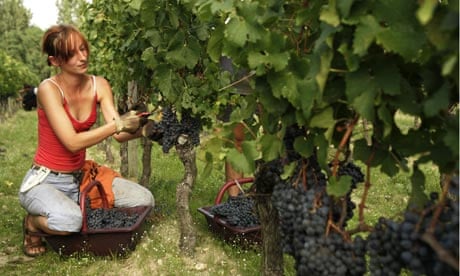The Californian wine buff testing his glass of wine in the sunshine might have noticed many things from his mouthful of Red Bicyclette pinot noir: "dark fruit aromas", as the website proudly proclaims, or "flavours of black cherry and ripe plum". But if he had paused a little longer and maybe sniffed a little deeper, the connoisseur might have detected another, rather different note: the bitter taste of being had.
Today, in a courtroom in the south-western French town of Carcassonne, 12 figures from the local wine industry were convicted of masterminding a lucrative scam in which E&J Gallo, the leading US winery, was conned into buying 18m bottles of plonk which had been repackaged as pinot noir.
In one of the most far-reaching scandals to have hit French vineyards in years, the executives from the Languedoc-Roussillon region were found to have made a €7m (£6.1m) profit through a fraud which lasted from January 2006 until March 2008. Overall, 13.5m litres of fake wine were shipped to the US to be drunk by unsuspecting US consumers. Gallo, founded by brothers Ernest and Julio following the repeal of prohibition in 1933, is now the biggest family-run winery in the US, known internationally as the leading exporter of Californian wines and within the industry as the world's most powerful wine brand.
The court made clear who it believed had been the "kingpin" of the affair: Claude Courset, head of Ducasse wine merchants, who acted as an intermediary between local producers and a conglomerate which resold the wine to Gallo. Courset was given a six month suspended jail sentence and a fine of €45,000.
Sieur d'Arques, the trading company that worked with Gallo on its popular brand of Red Bicyclette wines, was ordered to pay €180,000. The business had been the only defendant to plead not guilty in the affair, insisting that the fraud had been carried out without its knowledge.
The other defendants, including eight co-operative wine cellars from the surrounding Aude and Hérault regions, were fined according to their responsibility in the affair. Gallo has not yet filed any complaint to the French courts.
A carefully structured operation which permeated every level of the industry, the pinot scam began in 2006. During an audit of Ducasse in March 2008 investigators noticed that the business was buying pinot noir from local co-operatives for €58 a hectolitre despite a going rate of €97. Their suspicions were also raised by the sheer volume of pinot noir being produced in the region. Historically, Languedoc-Roussillon produced around 50,000hl a year. Suddenly, it had seen a dramatic upturn. Where, the inspectors wondered, were all the grapes coming from?
The answer was simple: the bottles being labelled pinot noir were in fact wine made from merlot or shiraz, less expensive grapes in plentiful supply around Carcassonne. Eight co-operatives were in on the con, supplying Ducasse with the produce; Ducasse then – for an estimated profit of €3.7m – sold the wine on to Sieur d'Arques, which resold it in bulk to Gallo.
American consumers, believing they were tasting the intoxicating red feted with such style in the Oscar-winning 2004 wine comedy Sideways, were none the wiser.
Before long, however, the secret was out, and the reaction, at home and abroad, was one of fury. While Gallo was forced to defend the authenticity of its produce, struggling French winegrowers were incredulous.
"[This has caused] a loss of image and of reputation which cannot be quantified," said Christophe Escarguel, a lawyer for the union of Pays d'Oc winegrowers, before the verdict. The union emphasised the "considerable damage" done to the "low-level winegrower who devotes his life to his vines".
Acknowledging what he called "a fraud which, given its size, has done serious damage to the wines of Languedoc", Judge Jean-Hugues Desfontaines ordered each of the accused to pay the Pays d'Oc wine syndicate €5,000 in damages.
The revelations were a blow to the Red Bicyclette brand, launched in 2004 and made instantly popular in the aftermath of Sideways, the Hollywood film which fuelled a craze for pinot noir in the US. The surge in demand came as a godsend for French growers desperately trying to fight off competition from New World wines and a growing domestic proclivity for beer and spirits.
The realisation that vast sums could be made by labelling plonk as pinot noir for the US market was, for some, too much to resist. One of the accused, a co-operative head, told the local newspaper, La Dépêche: "We would have put Yoplait [a brand of dairy desserts] on the wine if they'd asked us to."

Comments (…)
Sign in or create your Guardian account to join the discussion